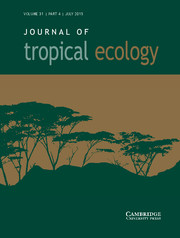Article contents
Pollen larceny of the tropical weed Solanum torvum by a Fijian endemic halictine bee with implications for the spread of plants with specialized pollinator requirements
Published online by Cambridge University Press: 03 May 2017
Abstract:
The ability of plants to colonize new habitats is influenced by their dependence on effective pollinators. This can be very important for plants that require specialized pollinators, especially when they disperse to islands that have low pollinator diversity. One form of specialization involves plants that require buzz-pollination, where bees must vibrate poricidal anthers at frequencies that allow pollen to be released. Pollen larceny is a phenomenon where insects ‘steal’ pollen from flowers which usually results in reduced pollination, but in some cases there can be a small contribution to pollination. Here we report pollen larceny in an endemic Fijian halictine bee Homalictus fijiensis that steals pollen by chewing anthers of the invasive weed Solanum torvum, which is a pollen-only plant requiring buzz pollination. In over nine hours of observations at six sites where H. fijiensis visited S. torvum, it never attempted to locate nectaries, it never buzzed anthers, and instead chewed anther tips, indicating an adaptation to exploit nectarless flowers with poricidal anthers without buzz-pollination. Analyses of 30 pollen loads from H. fijiensis collected from S. torvum flowers indicate 27 of these contained S. torvum pollen, ranging from 1% to 99% of total pollen, indicating it is a pollen vector for this plant. Our findings support arguments that super-generalist pollinators in island ecosystems can promote the spread of invasive plants, but go further by indicating that super-generalist strategies can extend to plants with highly specialized pollinator requirements.
- Type
- Research Article
- Information
- Copyright
- Copyright © Cambridge University Press 2017
Footnotes
Equal contributions.
References
LITERATURE CITED
- 8
- Cited by


